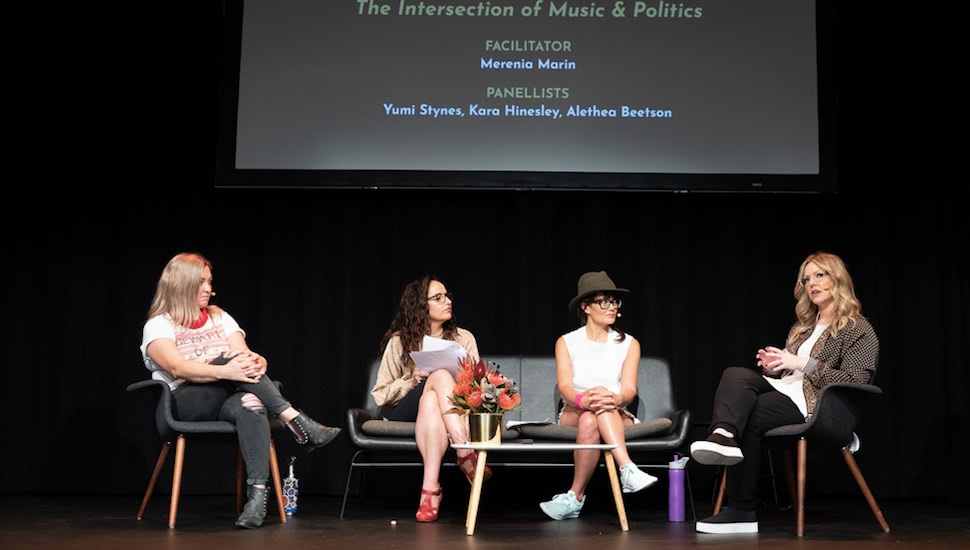How art can change politics in an increasingly connected world

There were many great discussions to come out of the second Australian Women in Music Awards. The event tackled important topics such as the way body image is unfairly connected to a women’s credibility and prospects as an artist, the vexed relationship that the Music industry has with Women and the intersection of politics and art.
Facilitated by songwriter and composer (ABC Music Publishing) Merenia Marin, the panellists consisted of women who have a wealth of knowledge and experience in the industry including BIGSOUND First Nations Producer & Artistic Director of Digi Youth Arts Alethea Beetson, Twitter’s Head of Public Policy and Government Affairs Kara Hinesley and feminist, TV and radio presenter, podcaster, author and former Channel V presenter Yumi Stynes.
The theme that the panel kept coming back to was the idea of artists being a major piece in the puzzle when it comes to influencing attitudes and behaviours around climate change. Kicking off the panels discussion, the following question was posed:
“Are artists’ aware of their own power”?
The general consensus was that people are starting to wake up and realise that no one’s doing anything about climate change. Alethea then noted that First Nations peoples have been predicting this future since the boats first arrived and that “you can’t have a conversation about climate without including First Nations peoples”.
The panel also discussed that there is a generation of artists that need to be aware of their responsibilities and the power of their platforms.
So what should artists be doing with this power? The panel discussed that artists really do have a responsibility to use their platforms for more than personal gain in the times we are currently living in, as to neglect this responsibility is a waste of power.
The key take-aways:
There are ways and channels that we can all use to make ourselves heard
Alethea noted that if you’ve got something of substance to say as an artist but it’s not cutting through the noise, lean on your community and get them to support your message. This includes community radio and press.
Communities don’t expect the same level of perfection and “image standards” that major labels demand, so take advantage of this.
When asked by Merenia if there were any solutions to being heard in our political system, Yumi floated the concept of civil disobedience as a potential way forward:
“If governments don’t start listening to us on issues like climate change and where the federal budget is spent, then we are going to have to do something that is very disobedient.”
Ultimately, we can rebel, but it helps if we rebel together.
We as an industry also need to add an intergenerational lens to the way we operate, as it is inherently ageist, which is not something we should lie down and take.
The internet is our most powerful tool to shifting the political tide
The internet can and is breaking down systemic issues around mainstream media attention, ageism and accessibility in the music industry.
As far as the internet and social media goes with furthering the causes that artists jump behind, Kara said that as far as Twitter goes, “there’s ways that we can push out the good stuff…”.
Twitter are also starting to look into behavioural insights as they used to review roughly 20% of accounts, as of now it’s up to 50%. This dramatic shift has taken place all within the space of the past 12 months.
Algorithmic bias on social media exists
Algorithmic bias was another topic that was brought up around the issue of artist content and messages reaching new and existing fanbases. Elaborating on this point, Kara noted that Twitter is starting to look at what is being churned out around these algorithms because it feeds into the way that they are being coded: “Our reality (at Twitter) is informed by our users”.
It was also discussed that the media has become almost irrelevant to an artist having the ability to push out their message. Elaborating on this point, Yumi chanted (and with great passion): “Who gives a fuck if Channel V doesn’t like you! because with the internet there is less reliance than ever on white racist media to push your message out.”
Democratisation of the internet has helped artists not have to go through the traditional forums and gatekeepers that are inherently and systemically racist. It was also noted that the point of record companies’ existence is starting to dwindle, as artists can now do more than they’ve ever been capable of with the power of the internet.
Androgyny makes draconian record labels uncomfortable
In perhaps the most powerful moment of the conversation, it was noted by Merenia that androgyny makes white mainstream music industry institutions uncomfortable.
“If you walk into a record label and give them a demo and they can’t visualise themselves getting off to you, then you’re not going to get very far.”
The panel fell a bit silent in this moment as they took in what had been said, no one really had an answer to combat this except for utilising the power of your community and the internet to spread your message rather than relying on the record labels thinking that your look and message is “palatable” enough.
Yumi did note that when the climate strike happened a few weeks ago, record companies would have been looking at those crowds and going “we need an anthem” and that it might transcend image at this point.
So, if you’re an artist with a passion for climate change, you could score a very lucrative sync deal from a single song on the issue, you just have to write one.
This article originally appeared on The Industry Observer, which is now part of The Music Network.






























